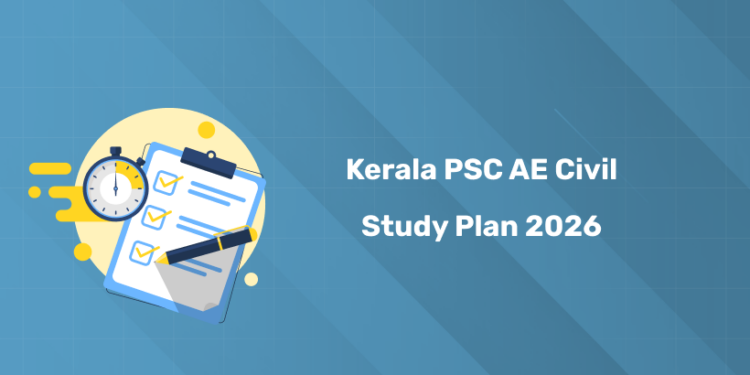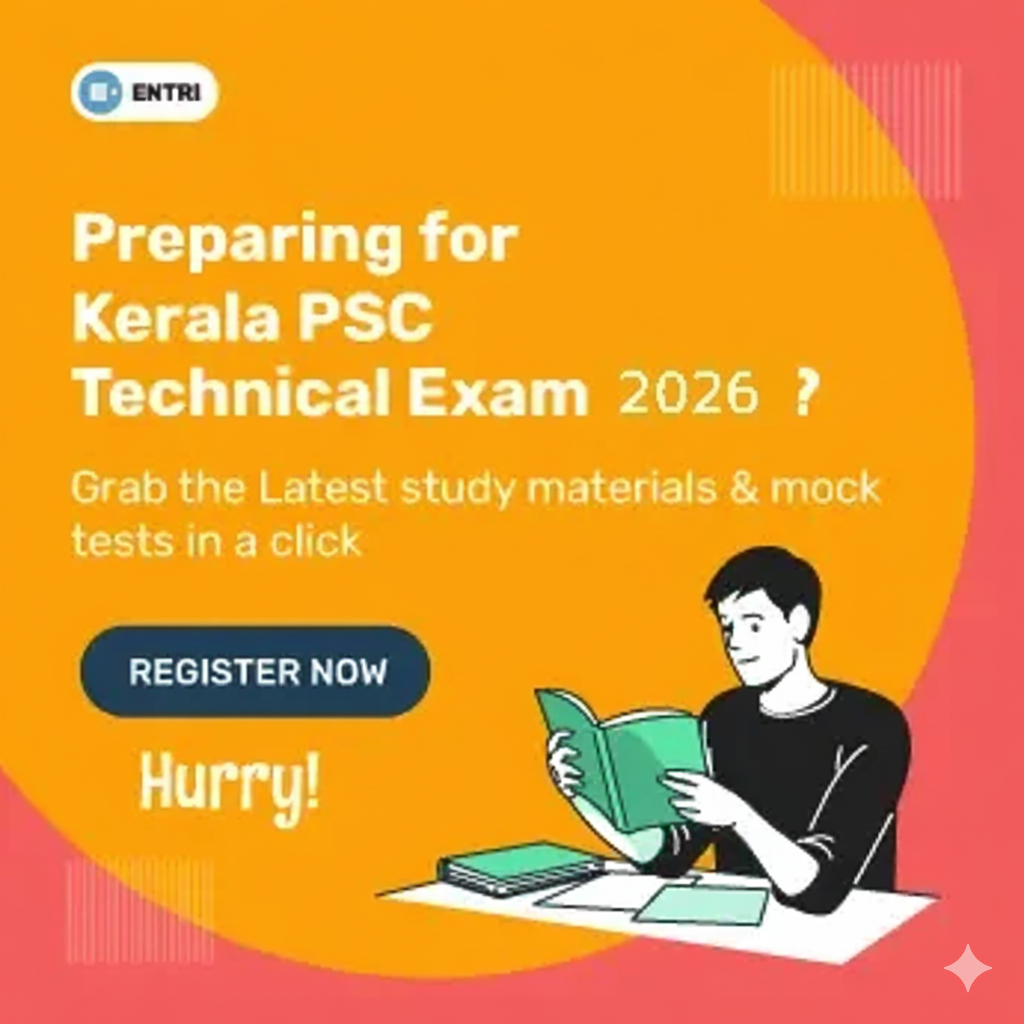Table of Contents
Preparing for the Kerala PSC Assistant Engineer Civil Exam 2026? In this blog, we’ve shared a simple 4-month study plan based on the official syllabus. It’s a rough guide to help you cover all topics step by step. You can follow it as it is or adjust it to suit your own pace and routine. Go through Kerala PSC Assistant Engineer (AE) Civil Study Plan 2026!
Ace KPSC Technical Exams! JOIN NOW!
Kerala PSC Assistant Civil Engineer 2026 Previous Question Paper PDF Download
| Question Paper Name | Download PDF |
| 130/2015 | |
| 143/2015 | |
| 072/2016 | |
| 080/2025 |
Kerala PSC Assistant Civil Engineer Syllabus 2026 PDF Download
1: Between the period of 1858-1947, how many Viceroys ruled over India?
Before going through the detailed study plan, it’s important to be familiar with the official syllabus. We’ve attached the Kerala PSC Civil AE Exam 2026 syllabus PDF below. Make sure to download and go through it carefully, so you can understand the subjects and topics covered.
Prepare for Kerala PSC Technical Exams with Entri
സർക്കാർ ജോലി എന്ന സ്വപ്നം ഇനി സ്വപ്നം മാത്രമല്ല! Join Kerala's Top-rated PSC Coaching Programs
Join NowKerala PSC Kerala PSC Civil AE Notification 2025 Highlights
| Particulars | Details |
| Name of recruiting organization | Kerala Public Service Commission (PSC) |
| Name of department | Irrigation Department |
| Name of post | Assistant Engineer (AE) Civil |
| Category Number | 537/2025 & 538/2025 |
| Number of vacancies | Anticipated |
| Notification Release Date | December 15, 2025 |
| Apply Date | December 15, 2025 |
| Last Date to Apply | January 14, 2026 |
| Mode of recruitment | Direct Recruitment |
| Mode of application | Online |
| Official website | keralapsc.gov.in |
Kerala PSC Assistant Engineer Civil Study Plan 2026
Struggling to cover your Civil Engineering syllabus? Here’s a comprehensive 4-month study plan based on the full syllabus, thoughtfully structured by Entri App. Use this as a rough guide to plan your preparation effectively. Whether you’re revising or starting fresh, this plan helps you stay on track, one day at a time! Explore Kerala PSC Assistant Engineer Civil Study Plan 2026
Month 1: Mechanics of Solids & Structural Analysis + Fluid Mechanics Basics
| Day | Topics |
|---|---|
| Day 1 | Concept of Stress and Strain |
| Day 2 | Bending Moment and Shear Force |
| Day 3 | Stresses in Beams |
| Day 4 | Deflection of Beams |
| Day 5 | Theory of Columns |
| Day 6 | Truss Analysis |
| Day 7 | Displacement Response using Energy Methods |
| Day 8 | Principle of Virtual Work |
| Day 9 | Statically Indeterminate Structures |
| Day 10 | Strain Energy Methods |
| Day 11 | Moving Loads and Influence Lines |
| Day 12 | Arches |
| Day 13 | Slope Deflection Method |
| Day 14 | Moment Distribution Method |
| Day 15 | Clapeyron’s Theorem (Three Moment Equation) |
| Day 16 | Kani’s Method of Analysis |
| Day 17 | Fluid Statics: Fluid Pressure, Buoyancy, Floatation |
| Day 18 | Fluid Kinematics |
| Day 19 | Dynamics of Fluid Flow |
| Day 20 | Flow through Orifices and Notches |
| Day 21 | Flow through Pipes |
| Day 22 | Boundary Layer |
| Day 23 | Drag and Lift on Immersed Bodies |
| Day 24 | Hydraulic Machines: Flow Through Vanes (Moving & Stationary) |
| Day 25 | Impulse and Reaction Turbines |
| Day 26 | Centrifugal Pumps |
| Day 27 | Open Channel Flow and Uniform Flow |
| Day 28 | Hydraulic Jump and Gradually Varied Flow |
| Day 29 | Dimensional Analysis and Model Testing |
| Day 30 | Revision / Practice Problems |
Month 2: Hydrology, Surveying, and Quantity Surveying
| Day | Topics |
|---|---|
| Day 1 | Hydrologic Cycle Overview |
| Day 2 | Precipitation Measurement and Data Analysis |
| Day 3 | Infiltration and Evaporation |
| Day 4 | Runoff Components and Computation |
| Day 5 | Hydrograph, Unit Hydrograph, and S Hydrograph |
| Day 6 | Irrigation Types and Methods |
| Day 7 | Soil Water Plant Relationships |
| Day 8 | Frequency of Irrigation |
| Day 9 | Computation of Crop Water Requirement |
| Day 10 | Stream Flow Measurement |
| Day 11 | Stage-Discharge Curve |
| Day 12 | Meandering of Rivers and River Training Works |
| Day 13 | Surface Water Systems: Diversion and Storage |
| Day 14 | Reservoir: Storage Capacity, Yield, Sedimentation, Useful Life |
| Day 15 | Groundwater: Aquifer Types and Properties |
| Day 16 | Steady Radial Flow into a Well |
| Day 17 | Estimation of Yield of Open Well |
| Day 18 | Basics of Surveying, Levelling and Contouring |
| Day 19 | Area and Volume Computation |
| Day 20 | Theodolite Survey and Triangulation |
| Day 21 | Mass Diagram and Theory of Errors |
| Day 22 | Electronic Distance Measurement (EDM) |
| Day 23 | Total Station Survey |
| Day 24 | Global Positioning Systems (GPS) |
| Day 25 | Remote Sensing and GIS Basics |
| Day 26 | Analysis of Rates, Data Book, Schedule of Rates |
| Day 27 | Analysis of Rates for Various Items |
| Day 28 | Detailed Specifications and Types of Estimate |
| Day 29 | Detailed Estimate Preparation, Quantities, Abstracts |
| Day 30 | Preparation of Bar Bending Schedules for RCC Works |
Month 3: Building Materials, Construction Technology, and Environmental Engineering
| Day | Topics |
|---|---|
| Day 1 | Construction Materials: Timber, Mortar, Iron and Steel |
| Day 2 | Structural Steel and Modern Materials |
| Day 3 | Concrete: Admixtures, Making, Properties |
| Day 4 | Concrete Mix Proportioning |
| Day 5 | Building Construction: Foundations |
| Day 6 | Cost-Effective Construction |
| Day 7 | Masonry, Lintels and Arches |
| Day 8 | Floors and Flooring |
| Day 9 | Roofs and Roof Coverings |
| Day 10 | Doors, Windows, and Ventilators |
| Day 11 | Finishing Works |
| Day 12 | Tall Buildings: Steel and Concrete Frame |
| Day 13 | Prefabricated Construction and Slip Form Construction |
| Day 14 | Vertical Transportation: Stairs, Elevators, Escalators, Ramps |
| Day 15 | Building Failures and Retrofitting |
| Day 16 | Construction Planning and Scheduling |
| Day 17 | Construction Disputes and Settlement |
| Day 18 | Ethics in Construction |
| Day 19 | Construction Safety |
| Day 20 | Principles of Materials Management |
| Day 21 | Quality Management Practices |
| Day 22 | Construction Procedures |
| Day 23 | Environmental Engineering: Water Sources and Demand |
| Day 24 | Quantity Estimation and Population Forecasting |
| Day 25 | Quality of Water, Physical and Chemical Treatment Methods |
| Day 26 | Design of Sedimentation Tank, Flocculator, Clariflocculator |
| Day 27 | Filters, Membrane Treatment, and Disinfection Methods |
| Day 28 | Water Distribution, Pumps, Hardy Cross Method |
| Day 29 | Wastewater Sources, Characteristics, Oxygen Demand |
| Day 30 | Sewer Design, Disposal, Streeter-Phelps Equation |
Month 4: Design of Structures, Geotechnical Engineering, Transportation & Urban Planning
| Day | Topics |
|---|---|
| Day 1 | Limit State Method of Design |
| Day 2 | Analysis of Reinforced Rectangular Beams |
| Day 3 | Shear Strength of RC Beam |
| Day 4 | Design of Shear Reinforcement |
| Day 5 | Bond and Development Length, Curtailment of Reinforcement |
| Day 6 | Design for Torsion |
| Day 7 | Design of One Way Slab and Cantilever Slab |
| Day 8 | Continuous Slab (Detailing Only) |
| Day 9 | Two Way Slabs |
| Day 10 | Limit State of Serviceability: Deflection and Cracking |
| Day 11 | Staircases: Design and Detailing |
| Day 12 | Columns: Effective Length, Short Columns Design |
| Day 13 | Columns under Compression, Uniaxial & Biaxial Bending |
| Day 14 | Design of Slender Columns |
| Day 15 | Wall/Strip Footing Design |
| Day 16 | Design of Cantilever Retaining Wall & Counterfort Retaining Wall |
| Day 17 | Circular Slabs (Simply Supported, Fixed, Partially Fixed) |
| Day 18 | Design of Water Tanks, Philosophy, IS Code |
| Day 19 | Prestressed Concrete: Concept, Materials, Methods |
| Day 20 | Prestressing Systems, Losses, Analysis of Prestressed Beams |
| Day 21 | Steel Structures: Bolted & Welded Connections, Tension Members |
| Day 22 | Compression Members, Beams, Roof Trusses, Purlins |
| Day 23 | Timber Structures: Columns, Composite Beams (Concepts) |
| Day 24 | Major Soil Deposits of India, Soil Classification |
| Day 25 | Three Phase System, Permeability, Effective Stress Principle |
| Day 26 | Shear Characteristics, Consolidation (Terzaghi’s Theory) |
| Day 27 | Soil Compaction |
| Day 28 | Stability of Finite Slopes (Swedish Circle & Friction Circle Methods) |
| Day 29 | Subsoil Stresses, Boussinesq’s Formula, Newmark’s Chart |
| Day 30 | Lateral Earth Pressure Theories: Rankine & Coulomb, Bearing Capacity, Site Investigation |
Preparation Tips for Kerala PSC Assistant Engineer Civil 2026 Exam
-
Know the Syllabus Thoroughly
Start your prep by understanding the complete syllabus. Focus only on relevant topics to avoid wasting time. -
Follow a Structured Study Plan
Stick to a realistic daily or weekly timetable—like the 4-month plan shared in this blog—for consistent progress. -
Prioritize High-Weight Topics
Allocate more time to subjects with higher marks like Structural Design, Building Materials, and Construction Technology. -
Use Standard Reference Books
Stick to reliable sources such as Civil Engineering by R.S. Khurmi, Irrigation Engineering by B.C. Punmia, and others. -
Practice Previous Year Questions
Solve Kerala PSC AE previous year papers to understand the question pattern and difficulty level. -
Revise Regularly
Dedicate one day each week for revision. It helps to support what you’ve studied and prevents forgetting old topics. -
Make Short Notes
Prepare quick revision notes, formulas, and concepts for last-minute review before the exam. -
Take Mock Tests
Attempt full-length mock tests under exam conditions to improve speed and improve time management.
| Kerala PSC AE Civil Exam Information Links | |
| Kerala PSC AE Civil Notification | Kerala PSC AE Civil Mock Test |
| Kerala PSC AE Civil Syllabus | Kerala PSC AE Civil Video Course |
| Kerala PSC AE Civil Exam Date | Kerala PSC AE Civil Study Materials |
| Kerala PSC AE Civil Application Form | Kerala PSC AE Civil Interview Questions |
| Kerala PSC AE Civil Vacancy | Kerala PSC AE Civil Job Profile |
| Kerala PSC AE Civil Admit Card | Kerala PSC AE Civil Salary |
| Kerala PSC AE Civil Previous Question Papers | Kerala PSC AE Civil Preparation Tips and Tricks |
| Kerala PSC AE Civil Best Books | Kerala PSC AE Civil Result |
| Kerala PSC AE Civil Eligibility Criteria | Kerala PSC AE Civil Cutoff |
| Kerala PSC AE Civil Selection Process | Kerala PSC AE Civil Exam Analysis |
| Kerala PSC AE Civil Answer Key | |










